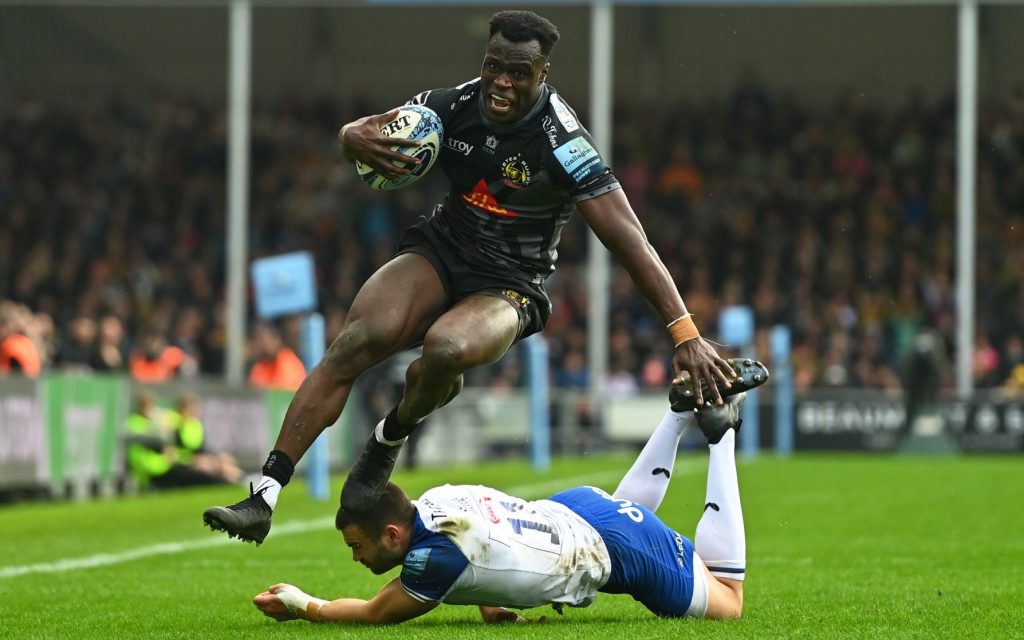
Last week, my Telegraph Sport colleagues reported on changes that could significantly impact the highest level of English professional rugby. The Premiership plans to eliminate existing restrictions on large-scale investment by implementing a new franchise format. The primary aspects of this proposal are:
- An expanded 12-team league, abolishing relegation, but maintaining promotion to support expansion to 14 teams
- Revising promotion criteria to include factors such as fan base, financial stability and regional value
- Centralisation of commercial operations, including broadcast and merchandise rights and kit deals under control of an NFL-like commissioner
- The potential rebranding of the league.
Instinctively, this idea runs counter to my beliefs over how the professional game should be run. I based my thoughts on the fact that if clubs are allowed unlimited spending – as I suspect would eventually happen despite initial reports that the salary cap will remain in place – the advantages for the richest clubs are locked in. Other sports have shown that final league positions correlate almost directly to a club’s wage bill. I have strongly opposed the concept of franchises, as they contradict the UK’s tradition of supporting clubs with whom individuals have a locational or emotional connection.
On the other hand, nobody can pretend the current Premiership is working in its current format. Theclub owners have something close to £1 billion and at least five clubs have gone bankrupt over the past three decades. This cannot go on.
Hard for clubs to cut costs in current climate
The difficulty for me is that although I dislike the basic premises of the Premiership’s proposals, I cannot find answers to the most basic points concerning failing businesses – how do you either cut costs or increase revenue?
Player welfare and safety rules, together with the eight substitution laws, means that squad sizes cannot be cut, and no player will accept deep salary cuts. Crowds are not growing fast enough to finance the league’s current spending, never mind growth. Despite spurious claims to the contrary, broadcasting rights have hit their natural ceiling and will not substantially increase any time soon.
Saying “I don’t like it” isn’t good enough without addressing these basic questions. Insisting on “no change”, despite 30 years of contrary evidence is disingenuous. How, specifically, can we attract much-needed cash without this idea?
Some reflexively trot out the mantra that no relegation crushes the hopes of dozens of ambitious clubs that are poised to claim a Premiership place. Only one club, Exeter, have come through the lower leagues and stayed in the Premiership – just one in 30 years. Such claims are myths. In contrast, there are many highly successful sports structures that thrive without relegation – the top five most successful American sports to begin with.

It should be noted that these proposals are backed by CVC Capital Partners, the private equity group that owns 27 per cent of the Premiership. You might suspect that CVC is the driving force behind all this, but every club owner has backed the initiative, and they are the ones who are forking out to cover current losses. It is easy to criticise if you are not on the hook financially.
RFU prepared to threaten stability of game
There are genuine concerns about whether this system will succeed. There is almost no tradition of sporting franchises in the UK, save for the infamous Milton Keynes Dons/AFC Wimbledon spat, which still causes rancour nearly 22 years later, and the recent move in cricket’s The Hundred competition. Will club supporters maintain their loyalty? Nobody knows the answer to this question, just as they do not know how a franchise designed to appeal to the Cornwall or Yorkshire markets might fare. What is certain is that this will not get an easy ride through the Rugby Football Union Council, some of whom have recently shown that they are prepared to threaten the stability of English rugby to get their way.
I might have similar doubts to some of the critics of the Premiership’s plans but unlike many of them, I do not think it is honest to pretend things are other than they are. I wish I could identify an agreed way to cut squad sizes or to increase revenues, but I can’t. In the light of this, I believe that the current proposals should be accepted and supported. If you disagree, I await your proposals to rectify the current economic dilemma.
It is understood that members of the RFU executive, including chief executive Bill Sweeney, are in favour of the Premiership’s initiative. At the same time, they should look to act as I recommended last week and properly order the game into distinct and strictly regulated professional, semi-professional and amateur strata. Since writing that column I have found out that 25 years ago the RFU Council rejected a similar proposal, called the Andrew Project, which came out just after Sir John Hall sold his Newcastle club to Dave Thompson for £1.
I repeat: “Are we going to carry on doing the same thing and expect different results?”

Last week, my Telegraph Sport colleagues reported on changes that could significantly impact the highest level of English professional rugby. The Premiership plans to eliminate existing restrictions on large-scale investment by implementing a new franchise format. The primary aspects of this proposal are:
- An expanded 12-team league, abolishing relegation, but maintaining promotion to support expansion to 14 teams
- Revising promotion criteria to include factors such as fan base, financial stability and regional value
- Centralisation of commercial operations, including broadcast and merchandise rights and kit deals under control of an NFL-like commissioner
- The potential rebranding of the league.
Instinctively, this idea runs counter to my beliefs over how the professional game should be run. I based my thoughts on the fact that if clubs are allowed unlimited spending – as I suspect would eventually happen despite initial reports that the salary cap will remain in place – the advantages for the richest clubs are locked in. Other sports have shown that final league positions correlate almost directly to a club’s wage bill. I have strongly opposed the concept of franchises, as they contradict the UK’s tradition of supporting clubs with whom individuals have a locational or emotional connection.
On the other hand, nobody can pretend the current Premiership is working in its current format. Theclub owners have something close to £1 billion and at least five clubs have gone bankrupt over the past three decades. This cannot go on.
Hard for clubs to cut costs in current climate
The difficulty for me is that although I dislike the basic premises of the Premiership’s proposals, I cannot find answers to the most basic points concerning failing businesses – how do you either cut costs or increase revenue?
Player welfare and safety rules, together with the eight substitution laws, means that squad sizes cannot be cut, and no player will accept deep salary cuts. Crowds are not growing fast enough to finance the league’s current spending, never mind growth. Despite spurious claims to the contrary, broadcasting rights have hit their natural ceiling and will not substantially increase any time soon.
Saying “I don’t like it” isn’t good enough without addressing these basic questions. Insisting on “no change”, despite 30 years of contrary evidence is disingenuous. How, specifically, can we attract much-needed cash without this idea?
Some reflexively trot out the mantra that no relegation crushes the hopes of dozens of ambitious clubs that are poised to claim a Premiership place. Only one club, Exeter, have come through the lower leagues and stayed in the Premiership – just one in 30 years. Such claims are myths. In contrast, there are many highly successful sports structures that thrive without relegation – the top five most successful American sports to begin with.

It should be noted that these proposals are backed by CVC Capital Partners, the private equity group that owns 27 per cent of the Premiership. You might suspect that CVC is the driving force behind all this, but every club owner has backed the initiative, and they are the ones who are forking out to cover current losses. It is easy to criticise if you are not on the hook financially.
RFU prepared to threaten stability of game
There are genuine concerns about whether this system will succeed. There is almost no tradition of sporting franchises in the UK, save for the infamous Milton Keynes Dons/AFC Wimbledon spat, which still causes rancour nearly 22 years later, and the recent move in cricket’s The Hundred competition. Will club supporters maintain their loyalty? Nobody knows the answer to this question, just as they do not know how a franchise designed to appeal to the Cornwall or Yorkshire markets might fare. What is certain is that this will not get an easy ride through the Rugby Football Union Council, some of whom have recently shown that they are prepared to threaten the stability of English rugby to get their way.
I might have similar doubts to some of the critics of the Premiership’s plans but unlike many of them, I do not think it is honest to pretend things are other than they are. I wish I could identify an agreed way to cut squad sizes or to increase revenues, but I can’t. In the light of this, I believe that the current proposals should be accepted and supported. If you disagree, I await your proposals to rectify the current economic dilemma.
It is understood that members of the RFU executive, including chief executive Bill Sweeney, are in favour of the Premiership’s initiative. At the same time, they should look to act as I recommended last week and properly order the game into distinct and strictly regulated professional, semi-professional and amateur strata. Since writing that column I have found out that 25 years ago the RFU Council rejected a similar proposal, called the Andrew Project, which came out just after Sir John Hall sold his Newcastle club to Dave Thompson for £1.
I repeat: “Are we going to carry on doing the same thing and expect different results?”









